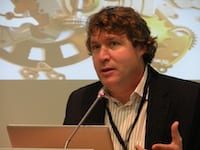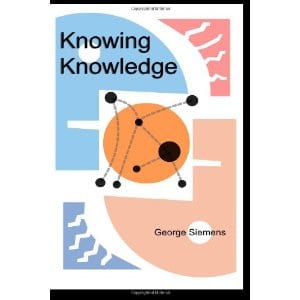
In this episode of the Learning Revolution podcast I talk with George Siemens, one of the leading thinkers on how technology is impacting learning and education.
One of the areas the areas that George has become known for, along with his collaborator Stephen Downes, is massive open online courses, or MOOCs. You may have noticed that MOOCs have become quite trendy lately. MIT and Harvard are among the very well-known institutions that have gotten into the MOOC game. Start-ups like Udacity and Coursera are also grabbing a lot of attention. And The New York Times has even called this the year of the MOOC.
I actually conducted this interview (like all of the other initial interviews on the podcast) several months ago as I was writing Leading the Learning Revolution. I knew MOOCs were an emerging phenomenon that I wanted to be sure to cover in the book, but I had no idea how popular they were about to become.
In any case, in this interview I talk with George about the massive online course phenomenon – including what kind of business models might emerge for them. We also discuss the challenges of learning, in general, in our high speed, hyper connected world and highlight some of the trends that George finds most exciting.
Click play, and enjoy. (And if you like what you hear, I’d be really grateful for a tweet!)
Listen to the Podcast
Podcast: Play in new window | Download | iTunes
Show Notes
00:44 – MOOCs are all the rage these days. MIT and Harvard are doing it, as are start-ups like Udacity and Coursera.
01:49 – Get the show notes at https://www.learningrevolution.net/episode6.
02:07 – Intro of George Siemens, a well-known thought leader in higher education circles on how technology is impacting learning and education. Siemens is an Assistant Professor in the Center for Distance Education and a researcher and strategist with the Technology Enhanced Knowledge Research Institute (TEKRI) at Athabasca University in Alberta, Canada
03:10 – Discussion of comment George made in a 2010 TEDx talk: “When we learn transparently, we become teachers.” Here’s the TEDx talk:
06:41 – Uncertainty and ambiguity now defines a growing number of fields. Knowledge that used to be stable is now much more fluid. The best way to make sense of the changes is to stay connected to others.
07:18 – In 2008 George, along with Stephen Downes, launched the Connectivism and Connected Knowledge (CCK) MOOC (see the 2011 version here). What made it seem like the stars were aligned for success at that time?
09:36 – The CCK MOOC was modeled on online conferences George had done in the past. There were discussion sessions in Moodle, Elluminate (now part of Blackboard) was used for live sessions, a daily e-mail was sent out. They had to find ways to tie it together – it was fragmented, distributed rather than organized like a traditional university class.
10:55 – There was a sense that something novel was happening, but really it was the way that things that had been going on for a decade could now be pulled together.
12:35 – What were some of the key strategies for bringing things together cohesively – addressing the “fragmentation?” It’s a question that is much broader than education, George says. Usually, a teacher or expert will be “frugal” in trying to structure the knowledge that is conveyed in a course, but the problem with this is that students may come from widely varying backgrounds and levels of experience.
15:20 – We have to develop both technical and social systems to make sense of such an “explosion” of knowledge. Socially, we have known how to do this for a long time. Technology – and our use of it – is still trying to catch up.
16:25 – The CCK MOOC emphasized that students needed to “own their own filtering” – basically, figure it out and learn in the process, form smaller groups “sub networks” within the larger MOOC.
17:30 – Today the systems for tying together distributed conversations are getting better and better – for example LMS systems with import functions for blogs, application programming interfaces (APIs) that allow for data flowing from one system to another.
18:29 – A lot of the burden is on the learner. Are learners ready? (See also Preparing Adults for Lifelong Learning.) How well prepared is the average adult to filter the massive flow of information?
19:30 – Human beings are naturally “meaning makers.” George cites Pirolli on information foraging. We categorize, we connect. That’s not new. But now the flow of information is at a pace that we can’t cognitively handle anymore – and probably haven’t been able to for a century or more. Past methods simply don’t work.
21:00 – Students are often completely overwhelmed in an open online course because they treat it like a regular course and try to read everything. You can’t track, read, and comment on everything. You have to find what is relevant to you. These are skills that not everyone has. The learners develop competence by going through the process.
23:00 – The technical tools are still not at a very developed level yet. There are various “recommenders” out there- i.e., Google, Amazon – but still not enough possibilities for control by individual learners.
24:05 – Are there good revenue models for MOOCs? George has no doubt they will develop and talks about a few possibilities. (See also How Will MOOCs Make Money?)

26:45 – What’s George really excited about right now? Data and analytics are one big area. These will alter how teaching and learning occurs, how organizations function. Mobile, gamification, and badges/alternative credentialing are also topics George touches on.
29:08 – The start-up ecosystem around education is also one of the more promising innovation points.
29:58 – Wrap up and sign-off. Be sure to visit George at http://www.elearnspace.org as well as at http://www.learninganalytics.net/ and http://www.connectivism.ca/. Also check out his book Knowing Knowledge (also available as a free pdf download).
Thanks so much for tuning into the Learning Revolution podcast. Please consider sharing with others by clicking https://www.learningrevolution.net/share to send out a tweet.
See also:
Podcast: Play in new window | Download | iTunes
The theme music for Learning Revolution is The Information Age by Anthony Fiumano, available on the Podsafe Music Network.
Related Posts
Association Mavens & the Learning Revolution
Entering the Shift Age with David Houle